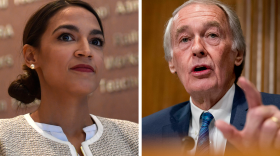EXPLORE MORE
Coming up Tuesday on BPR, live from the BPL:
CNN’s John King
Food policy analyst Corby Kummer
Reggie Ramos, Executive Director of Transportation for Massachusetts
Ari Snider, Maine Public Radio, on ICE’s actions in Maine
Recent segments
-
Emily Rooney: Should The Media Fact Check The President Live?
CNN has started carrying graphic that fact-check the president as he speaks live on air. -
BPR News Quiz: 'Rosencrantz & Guildenstern Are Dead'
Our weekly news quiz featured Shakespearean shenanigans. -
Cabral: Botham Jean's Brother Hugging His Killer Is Appropriate. A Judge Hugging A Defendant Is Not
When Botham Jean’s brother Brandt took the stand at the sentencing of his brother’s killer Amber Guyger, he had an unusual request for the judge. On the stand, Brandt forgave Guyger for killing his brother, and asked the judge if he could hug her. The judge allowed it. -
Paul Reville On Judge's Ruling In Harvard Case
Harvard's admissions process passes muster in federal court, but isn't perfect, Reville said. -
Nancy Koehn On What Backers Of The Green New Deal Can Learn From FDR
Roosevelt introduced sweeping progressive policies with his New Deal. Can today's progressives do the same around climate change? -
The Fever Breakers Band Started In The Basement Of Massachusetts General Hospital
MGH employees do more than take care of patients — they also sing!
Listen to previous shows
-

Corby Kummer: Restaurant Industry Wage Theft Has Worsened During the Pandemic
Award-winning food writer Corby Kummer joined Boston Public Radio on Tuesday to discuss a pandemic-era increase of wage theft in the restaurant industry, following a recent report by the nonprofit restaurant advocacy group One Fair Wage. “[Forty-three] states still allow a tipped minimum wage, which means as low as $2.13 an hour,” Kummer said. “Employees who are waitstaff have the liberty to take home all their tips based on that. The catch is that it’s on the restaurant manager to look to see, ‘what’s the average hourly earning of those tipped minimum wage staff members of mine,’ and ‘did it equal or better the state’s minimum wage.’ And if it didn’t, they — the managers — have to make up for it by paying them enough money to make them whole.” “There’s never been much enforcement of this, and there’s less than ever enforcement now,” Kummer added. “There’s evidence that there’s more of this failure to make up for any of these losses than there was before the pandemic.” Kummer is the executive director of the Food and Society policy program at the Aspen Institute, a senior editor at The Atlantic and a senior lecturer at the Tufts Friedman School of Nutrition Science and Policy. -

BPR Full Show: Say Cheese!
Today on Boston Public Radio: We begin the show by asking listeners how they feel about President Joe Biden’s spending bill shrinking as it nears finalization. Trenni Kusnierek updates listeners on all things sports, including anti-vaccine protesters storming barricades at Barclays Center to support Kyrie Irving, and Tom Brady’s 600th touchdown ball. Kusnierek is an anchor and reporter for NBC Sports Boston, as well as a Boston Public Radio contributor. Ali Noorani talks about why despite the United States’ declaration of China’s policies against its Uyghur community as a genocide, the government has not provided anyone refugee status. Noorani is the President & Chief Executive Officer of the National Immigration Forum. His forthcoming book is “Crossing Borders: The Reconciliation of a Nation of Immigrants.” Gov. Charlie Baker talks about how he thinks the state is doing on vaccinations following his mandates, and how he plans to approach housing issues. Baker is the governor of Massachusetts. Corby Kummer discusses the growing issue of wage theft in the restaurant industry, when waitstaff fail to make minimum wage off tips and their employer fails to pay the difference. Kummer is the executive director of the Food and Society policy program at the Aspen Institute, a senior editor at The Atlantic and a senior lecturer at the Tufts Friedman School of Nutrition Science and Policy. John King weighs in on Virginia's mayoral race and the state of the Democrats’ spending plan. King is CNN’s Chief National Correspondent and anchor of “Inside Politics,” which airs weekdays and Sunday mornings at 8 a.m. We end the show by asking listeners if bad photos are dead in the age of iPhones. -

BPR Full Show: Buy Nothing
Today on Boston Public Radio: Michael Curry discusses the importance of community partnerships in increasing vaccination levels, and weighs in on opinions on the mayor’s race in Boston’s Black community. Curry is the president and CEO of the Massachusetts League of Community Health Centers and a member of Gov. Charlie Baker’s COVID Vaccine Advisory Group. He’s also a member of the National NAACP Board of Directors and chair of the board’s advocacy and policy committee. Then, we ask listeners about whether they think a recent rise in union actions symbolizes genuine change, or if the current push for better labor practices will fizzle out. Dr. Katherine Gergen Barnett takes questions from listeners about all things vaccine related, as authorization for children aged 5-11 nears and people begin to mix and match booster shots. Gergen Barnett teaches in the Department of Family Medicine at Boston Medical Center and Boston University Medical School. Revs. Irene Monroe and Emmett G. Price III talk about how Evangelical Christians are looking for a new label for their community. Monroe is a syndicated religion columnist, the Boston voice for Detour’s African American Heritage Trail and co-host of the All Rev’d Up podcast. Price is the founding pastor of Community of Love Christian Fellowship in Allston, the Inaugural Dean of Africana Studies at Berklee College of Music and co-host of the All Rev’d Up podcast. Susan Orlean previews her latest book about animals, including the history of the movie “Free Willy,” her relationship with turkeys and her Valentine’s Day spent with a lion. Orlean is a staff writer for the New Yorker, and an author; her latest book is “On Animals.” We end the show by talking with listeners about their experiences with “Buy Nothing” Facebook groups and efforts for sustainable buying and selling. -

BPR Full Show: Speak Now or Forever Hold Your Peace
Today on Boston Public Radio: Stacey Abrams talks about what voters and politicians need to do to safeguard democracy, after Republicans blocked the Democrats’ voting rights bill in Congress. She also weighs in on the status of Democratic negotiations over President Joe Biden’s spending bill. Abrams is a voting rights activist, former Georgia State Representative and author. Then, we ask listeners how they approach compromise and negotiation following Stacey Abrams’ conversation about political compromise. Shirley Leung pushes for ending tent encampments and providing housing for those at Mass. and Cass and weighs in on rent control, in her latest column on the Mass. and Cass crisis. Leung is a business columnist for The Boston Globe and a Boston Public Radio contributor. Sue O’Connell discusses one of the first rural health clinics by and for transgender people located in Northampton, and weighs in on when celebrities who commit harm can return to the public eye. O’Connell is the co-publisher of Bay Windows and the South End News, as well as NECN's political commentator and explainer-in-chief. Then, we ask listeners their thoughts on marriage, following a New York Times article about how the married may soon become the minority. Andy Ihnatko updates listeners on the latest tech headlines, including Facebook’s upcoming rebranding, Donald Trump’s new social media platform, Google’s new signature phone and issues with Tesla’s self-driving cars. Ihnatko is a tech writer and blogger, posting at Ihnatko.com. -

BPR Full Show: Sublime Snacking and Celebrity Sighting
Today on Boston Public Radio: Chuck Todd begins the show by talking about what he thinks will get cut from the Democrats’ spending bill, and what “reconciliation” actually means. Todd is the moderator of “Meet the Press,” host of “Meet the Press Daily” on MSNBC and the political director for NBC News. Then, we asked listeners if they plan to get their kids vaccinated, as FDA authorization is expected to go through for children aged five to 11 in the coming weeks. Andrea Cabral discusses jury selection in the trial of Gregory McMichael, Travis McMichael and William Bryan, who shot Ahmaud Arbery in February of 2020. She also talks about today’s House vote on whether or not to hold Steve Bannon in contempt for defying a subpoena from a committee investigating the Jan. 6 insurrection. Cabral is the former Suffolk County sheriff and the former Massachusetts secretary of public safety. She is currently the CEO of the cannabis company Ascend. Paul Reville unpacks the boom in enrollment at Christian schools, and an elite Concord school cancelling its invitation to Nikole Hannah-Jones to speak about The New York Times’ 1619 Project. Reville is the former Massachusetts secretary of education and a professor at Harvard University’s Graduate School of Education, where he also heads the Education Redesign Lab. His latest book, co-authored with Lynne Sacks, is “Collaborative Action for Equity and Opportunity: A Practical Guide for School and Community Leaders.” Folu Akinkoutu talks all things snacks, including her recollections of helping her parents run vending machines, her favorite food fusions across cultures and snack containers that dredge up childhood memories. Folu Akinkuotu is the Boston-based creator of the Unsnackable newsletter. Jon Gruber highlights the legacy and importance of the Nobel Memorial Prize in economics, and how Joshua Angrist’s win for “natural experiments” in the field contributed to the rise in prominence of empirical economic research. Gruber teaches economics at MIT. He was instrumental in creating both the Massachusetts health-care reform and the Affordable Care Act, and his latest book is “Jump-Starting America: How Breakthrough Science Can Revive Economic Growth And The American Dream.” We end the show by asking listeners about their celebrity encounters, after John Legend tipped a street performer playing “All of Me” outside Faneuil Hall.









